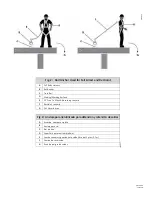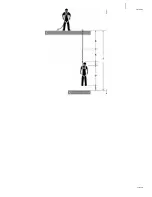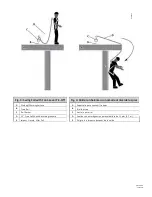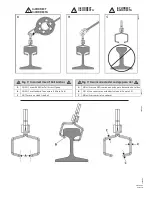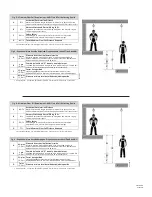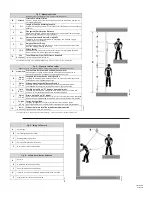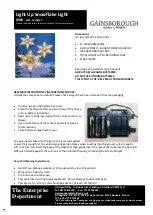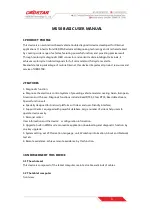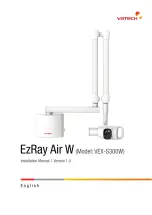
APPENDIX B
03122014
Incorrect Connections / Acronyms for Fall Protection and Fall Arrest / Inspection Record
INSPECTION RECORD
PLANILLA de INSPECCIÓN
Model #
Modelo N°
:
Serial #
N° de serie
:
Date of Manufacture
Fecha de fabricación
:
Inspection Date
Fecha de inspección
Inspector
Inspector
Comments
Observaciones
Pass/Fail
Pasó/No pasó
Corrective Action Needed
Accion correctiva a realizer
Approved By
Aprobado por
Acronyms for Fall Protection and Fall Arrest; ANSI Z359.0-2012
ACTD
Activation Distance
HLL
Horizontal Lifeline
AD
Arrest Distance
MAF
Maximum Arrest Force
CSS
Connecting Subsystem
mm
Millimeter
DD
Deceleration Distance
PFAS
Personal Fall Arrest System
DDV
Deceleration Device
PPE
Personal Protective Equipment
FACSS
Fall Arrestor Connecting Subsystem
SRD
Self-retracting Device
FAS
Fall Arrest System
TFD
Total Fall Distance
FBH
Full Body Harness
VLL
Vertical Lifeline
FF
Free Fall
VLLSS
Vertical Lifeline Subsystem
FFD
Free Fall Distance
WPS
Work Positioning System
Other Acronyms for Fall Protection and Fall Arrest
RGLS
Rope Grab Lanyard Set
ANSI
American National Standards
Institute
SAL
Shock Absorbing Lanyard
OSHA
Occupational Safety and Health
Administration
cm
Centimeters
ASTM
American Society for Testing
and Materials
kN
kilo-Newton
lbs
pounds (weight)
RPA
Rebar Positioning Assembly
TPA
Tower Positioning Assembly
Siglas para la protección y detención de caídas; ANSI Z359.0-2012
ACTD
Distancia de activación
HLL
Cuerda de salvamento horizontal
AD
Distancia de detención
MAF
Fuerza de detención máxima
CSS
Subsistema de conexión
mm
Milímetro
DD
Distancia de desaceleración
PFAS
Sistema personal de detención
de caídas
DDV
Dispositivo de desaceleración
PPE
Personal Protective Equipment
FACSS
Subsistema de conexión de
detenedor de caídas
SRD
Self-retracting Device
FAS
Sistema de detención de caídas
TFD
Total Fall Distance
FBH
Arnés de cuerpo completo
VLL
Vertical Lifeline
FF
Caída libre
VLLSS
Vertical Lifeline Subsystem
FFD
Distancia de caída libre
WPS
Work Positioning System
Other Acronyms for Fall Protection and Fall Arrest
RGLS
Equipo de agarre de cordón/cuerda
ANSI
Instituto Nacional de Normas
de los Estados Unidos
SAL
Cuerda de salvamento
con amortiguación
OSHA
Administración de Seguridad y
Salud Ocupacional
cm
Centímetros
ASTM
Sociedad Americana de Pruebas
y Materiales
kN
Kilo Newton
lbs
Libras (peso)
RPA
Ensamblaje de posicionamiento
con refuerzo
TPA
Ensamblaje de posicionamiento
con torre
DU
CON
.2
TU
AA
.2
TU
CON
.2
Fig. 13 - Incorrect Connections
A
Never connect two active components (snap hooks or carabiners)
to each other.
B
Never connect two active components (snap hooks or carabiners)
to a single D-ring at the same time.
C
Never connect in a way that would produce a condition of loading
on the gate.
D
Never attach to a object in a manner whereby the gate (of the snap
hook or carabiner) would be prevented from fully closing and locking.
Always guard against false connections by visually inspecting for closure
and lock.
E
Never attach explicitly to a constituent subcomponent (webbing,
cable or rope) unless specifically provided for by the manufacturer’s
instructions for both subcomponents (snap hook or carabiner and
webbing, cable or rope).
F
Never attach in a manner where an element of the connector (gate or
release lever) may become caught on the anchor thereby producing
additional risk of false engagement.
G
Never attach a spreader snap hook to two side/positioning D-rings
in a manner whereby the D-rings will engage the gates; the gates
on a spreader must always be facing away from the D-rings during
work positioning.
Fig. 13 - Conexiones incorrectas
A
Nunca conecte dos componentes activos (ganchos de cierre instantáneo
o mosquetones) entre sí.
B
Nunca conecte dos componentes activos (ganchos de cierre instantáneo
o mosquetones) a un solo anillo en “D” al mismo tiempo.
C
Nunca se debe conectar de una manera que se produzca una condición
de carga en la hebilla.
D
Nunca conecte a un objeto de tal manera que
la hebilla (del gancho de cierre instantáneo o del mosquetón) se vea
impedida de cerrarse y bloquearse por completo. Siempre protéjase de
falsas conexiones mediante la inspección visual del cierre y bloqueo.
E
Nunca conecte explícitamente a un subcomponente constituyente
(correa, cable o cuerda), a menos que se hayan proporcionado
específicamente por las instrucciones del fabricante para los
subcomponentes (gancho de cierre instantáneo o mosquetón y correa,
cable o cuerda).
F
Nunca conecte de modo que un elemento del conector (hebilla o
palanca de liberación) pueda quedar atrapada en el anclaje y por lo
tanto producir un riesgo adicional de conexión falsa.
G
Nunca conecte un gancho de cierre instantáneo del esparcidor a dos
anillos en “D” laterales/de posicionamiento en una forma que los
anillos en “D” se acoplen a la hebillas; las hebillas en un esparcidor
deben estar siempre orientadas hacia el lado opuesto de los anillos en
“D” durante el posicionamiento del trabajo.

